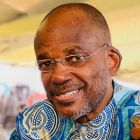Maulana Karenga, Ph.D.
“This is our duty: to know our past and honor it; to engage our present and improve it; and to imagine a whole new future and forge it in the most ethical, effective and expansive ways.”

Biography
An activist-scholar of national and international recognition, Dr. Karenga has had a far-reaching effect on Black intellectual and political culture since the 1960s. Through his intellectual and organizational work, his organization, The Organization of Us (us-organization.org), and his philosophy, Kawaida, he has played a vanguard role in shaping the Black Arts Movement, Black Studies, the Black Power Movement, the Black Student Union Movement, Afrocentricity, ancient Egyptian studies and the study of ancient Egyptian culture as an essential part of Black Studies
Dr. Karenga is also internationally known as the creator of Kwanzaa, an African American and Pan-African holiday celebrated throughout the world African community on every continent in the world. He is the author of the authoritative book on the subject: Kwanzaa: A Celebration of Family, Community and Culture, and lectures regularly and extensively on the vision and values of Kwanzaa, especially the Nguzo Saba (The Seven Principles).
His fields of teaching and research within Black Studies are: Black Studies theory, history and pedagogy, Africana (continental and diasporan) philosophy; ancient Egyptian (Maatian) ethics; ancient Yoruba (Ifa) ethics; African American intellectual history; ethnic studies; multiculturalism; and the socio-ethical thought of MalcolmX.
Maulana Karenga is professor and chair of the department of Africana Studies at California State University, Long Beach. He holds two Ph.D.’s: his first doctorate in leadership and human behavior/political science with focus on the theory and practice of African American nationalism (United States International University) and his second doctorate in social ethics with a focus on the classical African ethics of ancient Egypt (University of Southern California).
Work
Dr. Karenga is the author of 17 books and monographs and 4 co-edited books; 57 journal articles; 42 book chapters; over 650 columns and commentaries on critical issues; and numerous encyclopedia entries. Included in his list of books are Introduction to Black Studies, the most widely used introductory text in Black/Africana Studies; Selections from The Husia: Sacred Wisdom of Ancient Egypt; The Book of Coming Forth By Day: The Ethics of the Declarations of Innocence; Kawaida: A Communitarian African Philosophy; and a translation and ethical commentary on the classical Yoruba text, Odu Ifa, titled Odu Ifa: The Ethical Teachings. His most recent publications, in addition to Introduction to Black Studies, 4th edition are Maat, The Moral Ideal in Ancient Egypt: A Study in Classical African Ethics; Handbook of Black Studies (co-authored with Molefi Kete Asante); Kawaida and Questions of Life and Struggle; Essays on Struggle: Position and Analysis; The Message and Meaning of Kwanzaa: Bringing Good in the World; and The Liberation of Ethics of Malcolm X: Critical Consciousness, Moral Grounding and Transformative Struggle.





